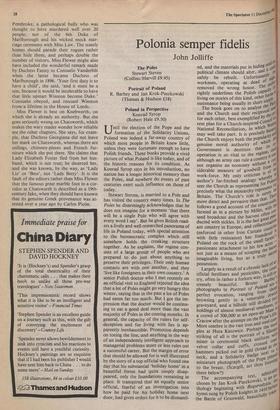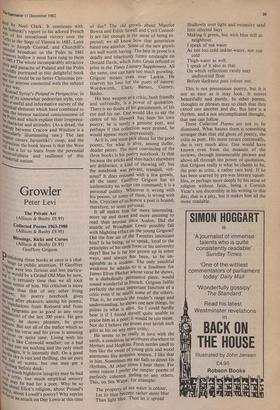Polonia semper fidelis
John Jolliffe
Portrait of Poland Poland in Perspective Konrad Syrop (Robert Hale £9.50)
Until the election of the Pope and the formation of the Solidarity Unions, Poland was indeed a far-away country of which most people in Britain knew little, unless they were fortunate enough to have Polish friends. These books provide a vivid picture of what Poland is like today, and of the historic reasons for its condition. As Konrad Syrop says in his introduction, no nation has a longer historical memory than the Poles, and nowhere do events of past centuries exert such influence on those of today.
Stewart Steven, is married to a Pole and has visited the country many times. In The Poles he disarmingly acknowledges that he does not imagine for a moment 'that there will be a single Pole who will agree with every word I say'. But he gives British read- ers a lively and well researched panorama of life in Poland today, with special attention to the bureaucratic complex which still somehow holds the creaking structure together. As he explains, the regime con- sists of a large group of people who are prepared to do just about anything to preserve their privileges. Their only human contacts are with one another, and they 'live like foreigners in their own country.' A senior Polish doctor who I met recently on an official visit to England rejected the idea that a lot of Poles might go very hungry this winter, saying that in the past a lot of Poles had eaten far too much. But I got the im- pression that the doctor would be continu- ing to eat a good deal more than the vast majority of Poles in the coming months. In general, the capacity of the rulers for self- deception and for living with lies is ap- parently inexhaustible. Promotion depends on toeing the line, and anything in the way of an independently intelligent approach to managerial problems more or less rules out a successful career. But the margin of error that should be allowed for is well illustrated by the story of a top official who found one day that his substantial 'holiday home' in a beautiful forest had quite simply disap- peared, only the foundations remaining in place. It transpired that an equally senior official, fearful of an investigation into how he paid for his holiday home next door, had given orders for it to be dismantl- ed, and the materials put in hiding lintiiolli4J political climate should alter, and it nt safely be rebuilt. UnfortunatelY workmen, operating at dead of Who( removed the wrong house. The ,3,11„tict rightly underlines the Polish caPael", sof living on stories of this kind, other fof sustenance being usually in short silPr*, The book goes on to analyse the and the Church and their recipro fcal n'or or each other, best exemplified hY the:for rent plan for a Church-inspired Coune",i' National Reconciliation, in which
p may well take part. It is precisely the Church enjoys both the o n's-„nd
pujaritY 'ate genuine moral authority of which co- Government is destitute that its operation is so vital to the regline'.5,4-1 although an army can rule a country i70.i. not organise an economy without 3 CoiC siderable measure of goodwill frcIrlf work-force. My only criticism is oi he author's far-fetched analogy whernebiand sees the Church as representing for r °' precisely what the monarchy represents 41 Britain. The Church's role is surelYh'ere more direct and pervasive than that. Tdde, follows a good account of the countrY:',Iie farmed as in a picture by Millet, with olir seed broadcast and the harvest oftens, ducted with sickles. It is the last greatrt:ion ant country in Europe, and collectivisa fie (enforced in other Iron Curtain couriti jo with little resistance) has foundereue?, Poland on the rock of the small passionate attachment to his feW atrest not just as a means of scraping the u" imaginable living, but as a truly sacred possession. l Largely as a result of a chronic ack °fLiaiiii tificial fertilisers and pesticides, the is suil
try, often in rather a forlorn way, tremelY beautiful. Bruno Barb
re:3 photographs in Portrait of Poland teep perfect evocation, ranging front st browsing gently in a venerable Je':',;to graveyard, and a hillside still divided 11`to holdings of almost mediaeval smallness;• a crowd of 300,000 at an open-air Masiife. Cracow after the attempt on the PoPes , More sombre is the vast iron and steel c oo ..P'st plex at Huta Katowice. Perhaps the 81, striking of all is the portrait of a Siles.4th miner in ceremonial black uniform w2 velvet collar and cuffs, crossed cTile hammers picked out in gold thread atto neck, and a Solidarity badge next wied miniature photograph of the Pope to the breast. (Scargill, art thou listen, there below?) ado.'" 'op. The accompanying text, chosen by Jan Krok-Paszkowski, is ari thology beginning with Bogurodzica e, ore hymn sung by Polish knights in 1410 h ,ns„ the Battle of Grunwald, beautifullYtr 'ated by Noel Clark. It continues with "an Sobieski's report to his adored French 1-i•life of his sensational victory over the here at the Siege of Vienna in 1683. Later :lett is Joseph Conrad, and Churchill's :Plendid broadcast to the Poles in 1941 however hollow it must have rung to them is 745.) The whole incomparably attractive :kit and panache of Poland and the Poles vividly Portrayed in this delightful book
there could be no better Christmas pre- for anyone connected with the subject any way,
s !konrad Syrop's Poland in Perspective, in tPa.ite of its somewhat pedestrian style, con- hiins a useful and informative survey of the kst°rical elements which have combined to sh"rto the intense national consciousness of bit Poles and which explain their irrepressi- a: character and attitudes. (As a detail, the DaalogY between Cracow and Windsor is a chlietliarlY illuminating one.) The last 'Pter covers Jaruzelski's coup, and the s'sipiression the book leaves is that the West res has a lot to learn from the perennial w ourcefulness and resilience of this °Ilderfut nation.











































 Previous page
Previous page